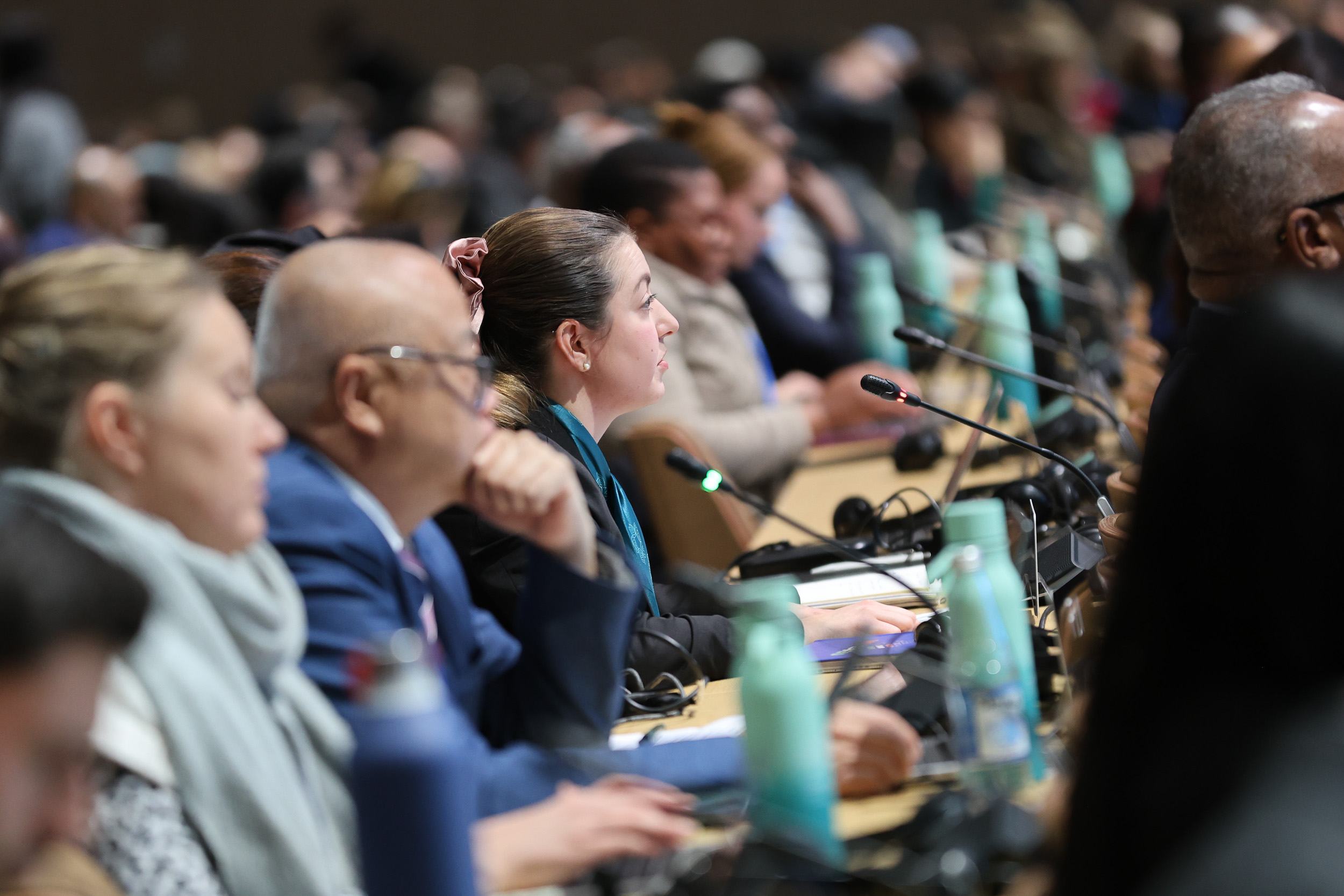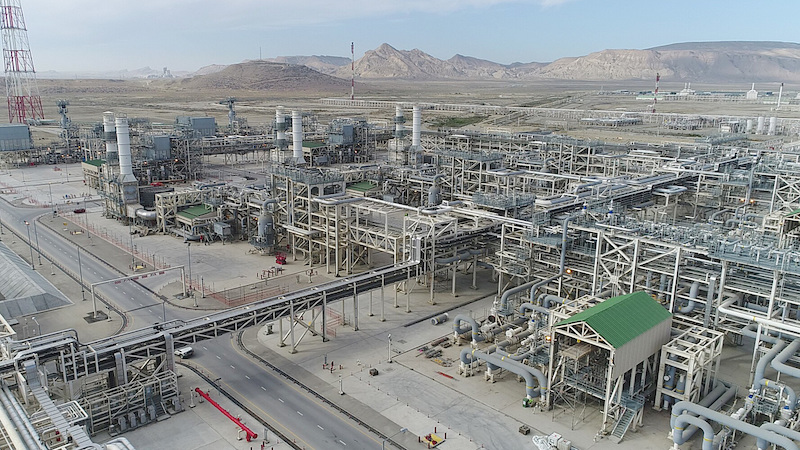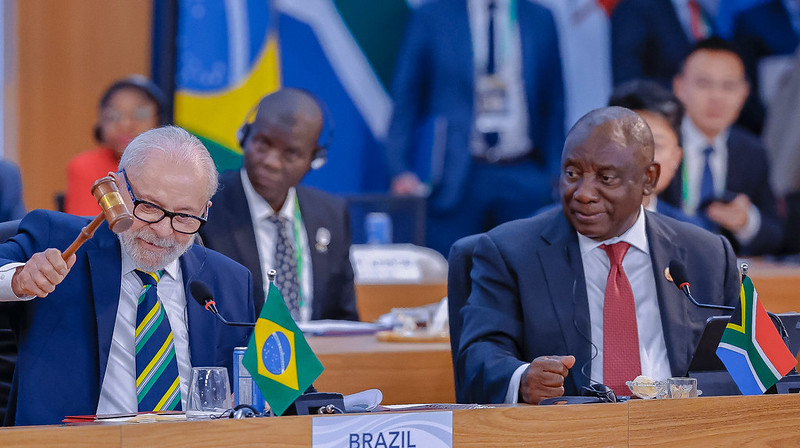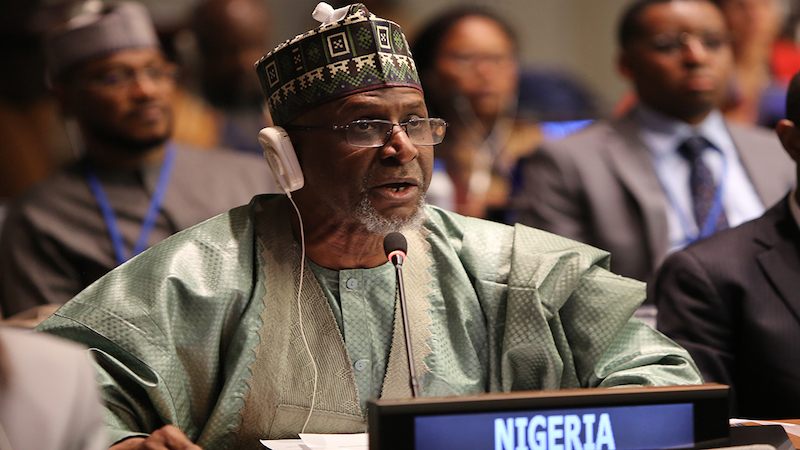This article will be updated throughout the day and an edited version will be sent out each evening as a newsletter – you can sign up here.
No concrete steer from G20 on tricky finance talks
At a press conference in Baku yesterday, COP29 President Mukhtar Babayev sent a cry for help with unlocking finance talks to the G20 leaders summit in Rio de Janeiro.
“The world is waiting to hear from them,” he said, adding “we want them to provide clear mandates to deliver at COP29 – this is their chance to show leadership.”
While Baku slept, G20 leaders in Rio put out a joint statement on tackling everything from hunger to artificial intelligence.
But the section on the COP29 finance goal was brief. “We look forward to a successful New Collective Quantified Goal (NCQG) outcome in Baku,” it said.
“We pledge our support to the COP29 Presidency and commit to successful negotiations in Baku,” it added.
UN climate chief Simon Stiell noted that G20 leaders had “sent a clear message to their negotiators at COP29: do not leave Baku without a successful new finance goal”. “This is in every country’s clear interests,” he added.
Fossil fuel transition talks rescued from brink of collapse at COP29
At the UN climate summit, some officials and campaigners alike had been hoping for more of a boost. Reuters reported yesterday that, according to two diplomats, the communiqué had planned to mention developing nations’ voluntary contributions to climate finance – one of the main sticking points in the COP29 finance talks where rich nations want to expand the donor base. But that did not make it into the final text.
Veteran climate campaigner Harjeet Singh accused G20 leaders of a “stark failure”. He said: “Their rehashed rhetoric offers no solace for the fraught COP29 negotiations, where we continue to see a deadlock on climate finance”.
“Without decisive progress on finance at COP29, we are steering towards a catastrophic temperature scenario, where the most vulnerable will bear the gravest consequences,” he added.
Still, some other analysts gave a more positive take on the G20 declaration. Andreas Sieber of climate campaign group 350.org said it could not be described as a “breakthrough” but had “got us a step closer to agreeing a finance deal here”, calling the leaders’ backing for the finance talks “significant”.
There was also hope that climate finance could eventually get a boost from the G20 leaders’ support for a tax on the super-rich, with the communique noting that “we will seek to engage cooperatively to ensure that ultra-high-net-worth individuals are effectively taxed”.
Rebecca Thissen, global advocacy lead at Climate Action Network International, said this aim “provides a clear pathway to raise the trillions of dollars required for climate action and sustainable development”.
The G20 communiqué also recognises the need for a strong replenishment of the International Development Association (IDA), a highly concessional World Bank fund to tackle poverty that observers told Climate Home could serve as inspiration for climate finance talks at COP29.
“Given that it’s a fund for development around the world and climate finance is development, we think that could be a good model,” said Luca Bergamaschi, from Italian think-tank ECCO.
IDA’s coffers are now being refilled – mostly by developed countries, among them a record $4 billion promise made on the sidelines of the G20 by the US as one of Joe Biden’s last actions as president. But some large developing countries also contribute funding to IDA, among them China, South Korea and Saudi Arabia.
EU reportedly mulling $200-300bn for NCQG
The European Union has refused to be publicly drawn on how much it thinks the post-2025 climate finance goal (known as the NCQG) should be — more than one week into COP29, its officials still haven’t publicly proposed an amount.
But Politico reports that it is internally discussing figures of between $200 billion and $300 billion a year by 2035. That’s similar to what observers at COP29 have told Climate Home that the EU is discussing.
Bergamaschi, from ECCO, said today that he thought a feasible upper limit for what could be agreed was $400 billion – if developing countries could be persuaded to agree to expand the list of contributors in some way beyond developed nations.
A recent UN-commissioned report by economists Vera Songwe, Nicholas Stern and Amar Bhattacharya found the figure should be at least $300 billion.
These numbers cover finance provided by governments, private finance mobilised by government investment and a proportion of multilateral development banks’ funding. This so-called “core goal” would replace an existing goal of $100 billion a year from 2020.
This is likely to be part of a larger, broader NCQG that will also include private finance and other sources of finance, and is likely to be at least $1 trillion a year.

EU negotiator Veronika Skolasztika Bagi (Photo by IISD/ENB | Mike Muzurakis)
African ministers: Keep private investments out of climate finance goal
African ministers have pushed back against the idea of including private investments in the new climate finance target being discussed at COP29.
Developed countries have suggested that private investments should count towards the total sum of the new collective quantified goal (NCQG). The existing $100-billion-a-year target – due to expire in 2025 – includes private finance that is directly linked to public money.
At COP29, African nations want “mobilised” private finance to contribute to a $1.3-trillion-a-year finance goal, but they argue “market rate loans” and “export credits” should be excluded.
Speaking to journalists on Tuesday, ministers from Zambia, Sierra Leone, Nigeria, The Gambia and Angola said that adding commercial private investments is unacceptable. They argued that African nations are demanding public climate finance as compensation for years of injustice caused by countries that have developed their economies using fossil fuels.
Nigeria’s environment minister Balarabe Lawal said he refused the idea of counting private investments when it was raised during a discussion with the European Union, telling his counterparts that “it is not going to work”. He told Climate Home that Africa does not attract enough private capital and so that should not be considered as a channel for addressing a critical issue such as climate change.
“The private investment in Africa is so small that it will not be able to address our issues,” he said. He added that the commitments made by developed countries “must be fulfilled”.
Rohey John Manjang, minister of environment, climate change and natural resources in The Gambia, said COP29 must deliver a clear decision on climate finance, adding that private money “cannot be included in the mode of implementation when it comes to public financing”.
Manjang said there is a need for a change in the financing approach in order to “correct the mistakes of the $100-billion target” by ensuring clarity on the contributor base and an implementation plan that is “transparent, trackable and actionable”.
Weighing in, Jiwoh Abdulai, minister of environment and climate change for Sierra Leone, said private investment has not worked for Africa because there are so many “hurdles and roadblocks” in accessing it.
Given the profit-based nature of private investments, Abdulai told Climate Home that these can work for infrastructure but not for addressing adaptation needs. He added that developed countries have “accrued climate debt” and so should pay out of their own pocket because “if private investments worked, we won’t be at COP”.
Augustine Njamnshi, technical chair of the Pan Africa Climate Justice Alliance (PACJA), said he was happy that African stakeholders are holding steadfast. He said Article 9 of the Paris Agreement, which addresses finance issues, has no language on investment but focuses on mobilisation of finance from public efforts – which, he added, should come in the form of grants.
“Who comes to COP to negotiate for investments in their country?” he asked. “If a country needs investments, it will go out there and find investors. Here we are negotiating climate finance.” He told Climate Home that climate finance has to be provided by developed to developing countries for climate action targeting the priority areas of adaptation and loss and damage.
Fossil fuel transition left out at G20
On global efforts to cut emissions and boost clean energy, the G20 leaders said they “fully subscribe to the ambitious and balanced outcome” from COP28 in Dubai last year, without explicitly mentioning the pledge made there to “transition away from fossil fuels” in energy systems.
Ani Dasgupta, head of the World Resources Institute, said it was “unfortunate that the G20 failed to reiterate the commitment to shift away from fossil fuels” – which was widely viewed as a historic outcome from the COP28 summit.
Saudi Arabia was one of the main blockers for the fossil fuel language at G20, the New York Times reported. The oil-rich kingdom has also blocked fossil fuel transition language at COP29, where observers told Climate Home Saudi negotiators were “happy to be destructive”.
The G20 communiqué does mention the COP28 pledge to triple renewable energy and double energy efficiency. The text also expresses support for “low-emission technologies”, which was interpreted as meaning fossil gas in the outcome from COP28.
The G20 declaration appears to even give room for the expansion of other fossil fuels, as it expresses support for “abatement and removal technologies in line with national circumstances by 2030” – which are ways to stop emissions from burning oil, gas and coal from being released into the atmosphere.
India, Indonesia and China have large expansions of coal-fired power in the pipeline, while the US is behind a third of the world’s planned expansion of oil and gas.
Champa Patel, executive director for governments and policy at the Climate Group, said that to avoid backsliding, the G20 needed to be bolder.
“With an incoming President Trump, this task will get harder. It’s outrageous that in 2024, which is already the hottest year on record, the biggest economies in the world can’t state the truth: that we need to phase out fossil fuels now,” she said.

The Sangachal oil and gas terminal in Azerbaijan. (Photo: Azerbaijan Presidency)
Azerbaijan and the missing NDC
Ahead of COP29, the “Troika” of 2023-2025 COP host countries – the UAE, Azerbaijan and Brazil – said they would produce by the end of this year new national climate plans (NDCs) in line with the global goal of limiting warming to 1.5C.
The UAE jumped first just before COP29, followed by Brazil, although experts are still arguing over whether those plans are in fact 1.5C-aligned. But Azerbaijan – whose president has described its oil and gas reserves as “a gift from god” – has yet to announce its NDC or a 2035 emissions-reduction target. There has been speculation it might do so during this year’s COP hosted on its soil, which is due to end on Friday.
On Tuesday, when asked by Climate Home, Azerbaijan’s agriculture minister told journalists the NDC is now being finalised. But he and the country’s lead negotiator, Yalchin Rafiyev, said they could not confirm when it would be published.
“The process itself is a very complex one,” said Rafiyev, adding that it requires “significant” data collection and coordination between agencies to achieve a “really tangible outcome”. “For us, the quality is more important than.. rushing,” he said, adding that work is ongoing.
In brief…
Berlin chips in: Germany announced a new pledge of €60 million ($63 million) to the Adaptation Fund at a ministerial dialogue this Tuesday. The fund has struggled to meet its yearly target of $300 million since 2022 and had raised a scarce $61 million at COP29 before Germany’s pledge. The new funds ramp up the total amount to around $124 million.
A thousand days of war: Today marks 1,000 days since Russia’s invasion of Ukraine. At Ukraine’s COP29 pavilion, you can watch a virtual reality short depicting the war’s destruction with scenes such as dolphins dying in the sea (from mines and acoustic trauma from explosions), a deer engulfed in a forest aflame after a bombing, and destroyed cities. According to data provided by Ukraine, in one year of war, Russia caused $71 billion in environmental damage, committed 6,500 crimes against the environment, and released 180 million tonnes of CO2 – three times more than Azerbaijan’s annual emissions.

Ukraine’s pavilion at COP29 (Photo: Ministry of Environment)
Phasing out fossil fuel subsidies: The UK, Colombia and New Zealand have joined a 16-strong coalition of governments aiming to phase out fossil fuel subsidies. The alliance focuses on addressing international barriers to eliminating public support for fossil fuels like global restrictions on taxing aviation and shipping fuels. Its members also commit to producing inventories shedding light on their own fossil fuel subsidies. A year on from the coalition’s original launch, only a third of them have stuck to that promise.
Waste methane pledge: Thirty states – among them Brazil and the US – have signed a COP29 presidency pledge to reduce methane emissions from organic waste. The countries committed to set sectoral targets to achieve that aim in their upcoming NDCs. The initiative has gathered support from seven of the 10 largest methane-emitting countries from organic waste. It is the third largest source of methane behind agriculture and fossil fuels.

